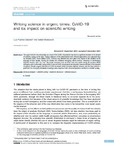Writing science in urgent times: CoViD-19 and its impact on scientific writing

Use este enlace para citar
http://hdl.handle.net/2183/32870
A non ser que se indique outra cousa, a licenza do ítem descríbese como Atribución-NoComercial-SinDerivadas 4.0 Internacional
Coleccións
- Investigación (FFIL) [879]
Metadatos
Mostrar o rexistro completo do ítemTítulo
Writing science in urgent times: CoViD-19 and its impact on scientific writingData
2022-08Cita bibliográfica
Puente-Castelo, Luis and Moskowich, Isabel. "Writing science in urgent times: CoViD-19 and its impact on scientific writing" ICAME Journal, vol.46, no.1, 2022, pp.19-32. https://doi.org/10.2478/icame-2022-0002
Resumo
[Abstract] : The urgent need for new knowledge as a result of the CoViD-19 pandemic has led to a significant increase in the amount of scientific writing on the topic. Various analyses of this phenomenon from different approaches have appeared thus far (Horbach 2020; Torres-Salinas 2020). However, less attention has been paid to the impact of this situation on the language of these studies, looking into whether the continued emergency affects authors’ conscious or unconscious linguistic choices, and if so, how. This article compares texts on CoViD with texts written during the previous MERS emergency and its aftermath, trying to find if texts on CoViD present particular linguistic features reflective of this situation
of urgency. Results suggest that texts on CoViD do indeed exhibit particular linguistic features, and that these point to a preference for conveying immediate knowledge and a departure from rhetorical practices common in scientific writing
Palabras chave
Discourse analysis
Scientific writing
Academic discourse
Editorial pressure
Scientific writing
Academic discourse
Editorial pressure
Versión do editor
Dereitos
Atribución-NoComercial-SinDerivadas 4.0 Internacional
ISSN
1502-5462






